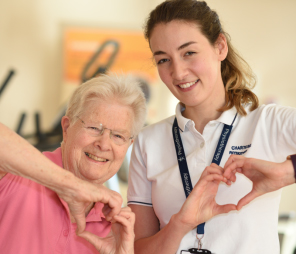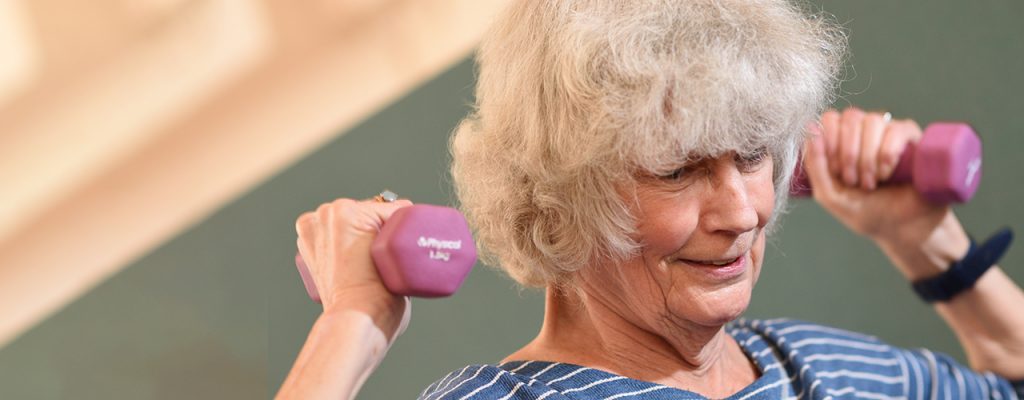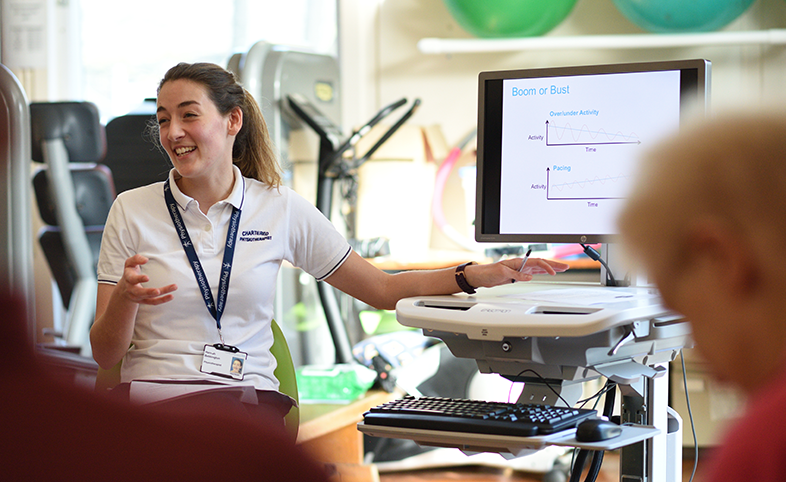Give yourself the gift of some self love this valentine’s day with a new exercise and support group
- People in Cambridge with osteoarthritis are being encouraged to indulge in some self love during the month of Saint Valentine by enrolling in a pain reduction and exercise programme, ESCAPE-pain.
- Chronic pain affects between one-third and one-half of the UK population, and is linked to feelings of low mood and a loss of quality of life [1]
- Participants in the NHS-backed ESCAPE-pain programme nationwide have reported a significant improvement in their ability to take part in daily activities, as well as reduced pain and increased quality of life. Now the benefits are being felt in Cambridge by its first cohorts of Cambridge participants. [2]
 Approximately one in five people over the age of 45 in Cambridgeshire, representing 56,881 people, live with knee osteoarthritis and of the same age group, one in nine have hip osteoarthritis. [3]
Approximately one in five people over the age of 45 in Cambridgeshire, representing 56,881 people, live with knee osteoarthritis and of the same age group, one in nine have hip osteoarthritis. [3]
The ESCAPE-pain programme, which in Cambridge is delivered by the Cambridge University Hospitals NHS Foundation Trust at Addenbrooke’s Hospital, offers those affected by osteoarthritis the opportunity to learn to manage their symptoms and exercise safely in addition to potentially making some new friends. Health Innovation East can now reveal that research into the first cohorts show an improvement in the majority of participants’ symptoms.
Jag Ahluwalia, Chief Clinical Officer from Health Innovation East comments:
“ESCAPE-pain has made a great start in the Eastern region. According to the first reports from participants, the programme has demonstrated a clear clinical impact, bringing a reduction in pain and improvement in participants’ quality of life.”
Charles retired two years ago and believes ESCAPE-pain is different because it is more motivational than other physio sessions. He now does much more exercise at home, choosing to go up the stairs wherever he can. For Charles, his Osteoarthritis means he needs to have double knee replacement, but through the course and the lifestyle changes resulting from it, he hopes to delay the need for surgery.
Charles, who attends sessions at Addenbrooke’s Hospital, says, “the system works; I’ve only been coming to the classes for two weeks, but it’s already helped me so much. I usually walk with a stick but today I have come here without it. My aim is to get back on the golf course as I’ve been unable to play since last year due to my condition”.
It’s not just about the information or the exercise routine for Charles. “Most importantly it’s fun – it’s a chance to meet people and exercise in a friendly environment.”
Patricia, another Addenbrooke’s participant, says, “ESCAPE-pain is a brilliant mix of information and exercise – it’s sociable and fun, with excellent guidance. Starting next week, I’m going back to my gym and, for the first time in a long time, I’ll not just be using the pool. The class has made me confident in using all the equipment and knowing what level of exercise is right for me.”

A degenerative condition
Osteoarthritis is a degenerative condition that results in pain and disability and can severely affect sufferers’ lives. Stiffness and pain in the joints, along with muscle weakness and inflammation, all get in the way of daily activities, leading many osteoarthritis sufferers to feel they are missing out on opportunities to participate in normal activities such as getting about and socialising with friends and family. Many avoid being physically active for fear of damaging their joints, even though physical activity is recommended by experts as one of the most effective ways to reduce pain. [4]
How it works
ESCAPE-pain participants attend group sessions over a six-week period where they address a specific topic relating to joint pain, followed by facilitator-led exercise sessions. The programme provides the reassurance they need to engage in appropriate movement as well as practical support to exercise safely.
Kelly-Marie Grant, Superintendent Physiotherapist at Cambridge University Hospitals NHS Foundation Trust said: “Before joining our course, we found that people believed that if their joints were sore, they shouldn’t exercise, but research has shown that exercise for joint pain is hugely beneficial. The old saying ‘if you don’t use it, you lose it’ definitely applies here and participants on our course are shown how to exercise in a way that is safe and specifically tailored for their condition.”
Nationwide research
Research into the programme nationwide has shown that the simple self-management tools and appropriate exercises in the programme can successfully improve the lives of osteoarthritis sufferers by improving their mobility, reducing pain and improving their mental wellbeing. [5/7]
The programme has been clinically proven to be effective at enabling participants to participate in daily tasks, reducing pain and improve quality of life for up to 2½ years after completing the programme [2]. Of the participants in the 2019 Cambridgeshire ESCAPE-pain cohorts, 66% reported improvement in their ability to take part in daily activities, and 60% reported pain reduction. [2]
In addition to the physical symptoms, those in persistent pain are four times more likely to suffer with depression than those without and [1] two-thirds of people with osteoarthritis report symptoms of depression when their pain is at its worst. [6] In the Cambridgeshire 2019 cohorts, 48% of ESCAPE-pain participants reported an improvement in their quality of life following the programme. [3]
The goal of ESCAPE-pain
The main goal of ESCAPE-pain as an osteoarthritis treatment is to help sufferers manage their own pain and discover what exercise they can do safely to improve their overall mobility and improve their mental wellbeing.
ESCAPE-pain is an NHS-backed, national programme that launched in central Cambridge in summer 2019. Sessions are available in the city as well as the wider county. Cambridgeshire locations include Peterborough, Huntingdon, St Neots and Ramsey.
To find out more about ESCAPE-pain sessions in central Cambridge and other locations, or to find out how to register for an available course, visit escape-pain.org.
References
- ‘Almost half of people with chronic pain have a diagnosis of depression’ https://www.nice.org.uk/guidance/gid-ng10069/documents/final-scope
- Evidence of the programme’s successes: https://escape-pain.org/about-us/real-world-evidence/
The evidence shows the positive impact of the programmes through the pre intervention and post intervention outcome scores for the Knee OA Outcome Score (KOOS), Hospital Anxiety and Depression Scale (HADS), and the Short Warwick-Edinburgh Mental Wellbeing Scale (SWEMWBS) demonstrating ESCAPE-pain’s clinical effectiveness in practice, with a strong resemblance to what was found during the clinical trial (Hurley et al., 2007).
Cambridgeshire specific data is provided by HIN and Escape Pain in collaboration with One Leisure Huntingdon, One Leisure St Neots and Addenbrooke’s Hospital. - Local osteoarthritis (OA) population for Cambridgeshire local authority (from the Versus Arthritis MSK calculator). https://www.versusarthritis.org/media/13260/cambridgeshire-oa.pdf
- BMJ Infographic. Therapeutic exercise relieves pain and does not harm knee cartilage nor trigger inflammation. Alessio Bricca, Ewa M Roos, Carsten B Juhl, Soren T Skou, Danilo Oliveira Silva, Christian J Barton (2019); McAlindon TE, Bannuru RR, Sullivan MC, et al. OARSI guidelines for the non-surgical management of knee osteoarthritis. Osteoarthritis Cartilage (2014);22:363-88. link
- Hurley MV, Walsh NE, Mitchell H, Nicholas J, Patel A. Long term outcomes and costs of ESCAPE-knee pain: an integrated rehabilitation programme for chronic knee pain. Arthritis Care and Research, 2012 Feb;64(2):238-47. doi: 10.1002/acr.20642. link
- Arthritis Care (2010) Arthritis Hurts: The hidden pain of arthritis link
- Long-term clinical benefits and costs of an integrated rehabilitation programme compared with outpatient physiotherapy for chronic knee pain Sally A. Jessep a, Nicola E. Walsh b, Julie Ratcliffe c, Michael V. Hurley d, (2009) link
You may also be interested in…

Read our impact story to find out more about this programme here.
Share your idea
Do you have a great idea that could deliver meaningful change in the real world?
Get involved